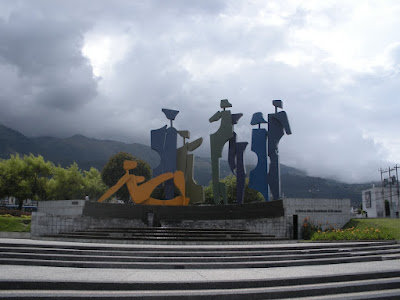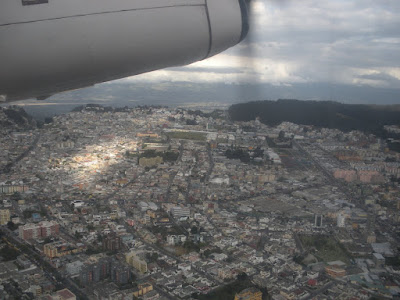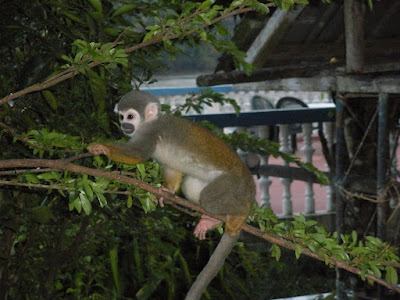
I had my last day in Quito to myself, so I decided to ride the TelefériQo, Quito's multi-million dollar cable car that takes you up one of the mountains that surrounds the city. Unfortunately, it was kind of cloudy, so the view was only so-so, but luckily it didn't rain.


When I got to the top, I spotted two American-looking kids and introduced myself. They were two Bowdoin students, Rachel and Alex.

Rachel was studying abroad in Quito, and Alex was visiting her. We started playing the name game, and the coincidences started getting pretty crazy. One of her close friends on the program had gone to high school with me. Another girl on the program was the sister, who I met briefly, of the guy who sat next to me on the plane to Quito. And El Maple, the vegetarian restaurant where I had eaten the day before, was her favorite spot in Quito. At the same time, we both exclaimed, "maybe we're related!"
After that, I went and got lunch at a nice vegetarian restaurant in Quito, and explored La Plaza Grande a little bit.
 |
| From Eric Goes Around the World |
 |
| From Eric Goes Around the World |
I also met these guys, who were holding a sign that read "We are looking for an honest man..." I went up to them and said, "You guys looking for me?"
 |
| From Eric Goes Around the World |
One common cultural trait of Ecuadorians is that they are very upset by the level of corruption in their country's politics, so I guess this had something to do with that.
I decided to go check out a museum with a Chagall exhibit, but right when I got in I found myself in a conversation with the guy selling books at the gift shop. We talked for over an hour, mostly in English, and I ended up missing the exhibit. At first, he talked to me about how difficult it was to find a job in Ecuador. He had gone to college ten years ago and studied marketing, but was never able to land a good job even though he had the contacts and recommendations. He had spent most of the time doing unpaid internships. He was 35 years old and living with his parents. His sister, who had gone to America, graduated from Wharton and was enjoying a successful career. Soon, however, he changed the subject to world politics. He told me he likes Obama (as almost everybody in Ecuador told me). But without warning he started talking about how much he dislikes the Jews for causing all the trouble in the Middle East. Nearly realizing his mistake, he asked, "Oh wait, you're not Jewish, are you?" I wanted to hear more of what he would say, so I told him I wasn't. He went on and on about how the Jews caused all the wars in the world, how the Jews are rich and look down on everybody else, and so on. He thought that Hitler had "the right idea," but maybe hired the wrong people or took it too far. He thought that Germany would save the world, but that damn Angela Merkel keeps apologizing to the Jews. I asked him if he knew any Jews. "It's funny, actually," he said. "There was a Jewish guy at the place I used to work, and he was the only guy there I liked." He also had a cousin who had become Jewish living in France, a psychiatrist. I asked if he was a good person. "Yes, he's a nice guy," he answered, "but I don't know why he would get involved with something like that." Strangely, he also talked about how much anti-semitism there is in Europe. I pointed out to him that his views were anti-semitic, to which he eventually agreed, but didn't see it as a problem.
That night I talked about this experience with Manuel, who is atheist. He said the problem is relgion, that Ecuador is a Catholic country and the people are taught to hate the Jews. When he was in elementary school, they would have religion classes, which he didn't have to attend (as an atheist), but the kids were taught that the Jews killed Christ and so on. Furthermore, he said, since there are so few Jews in Ecuador, to most Ecuadorians Jews are like Martians and the beliefs Ecuadorians hold about Jews have no basis in reality or experience.
That was the first time anyone had expressed such anti-semitic views to my face, and it gave me a lot to think about.




















































